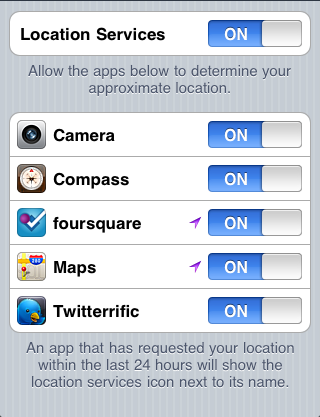It seems like everyone nowadays has an iPhone. We're constantly using it keeping tabs on our Facebook, Twitter, email, blogs (guilty as charged), and so on. But do you realize that our iPhones are also keeping tabs on us? It's true. Here are a few interesting things you didn't know about your iPhone.
 |
| Location Services menu |
Location Services stores GPS locations on your phone
Whenever you have Location Services turned on, your iPhone begins to take and store your GPS locations and the date/times you were at those locations on the hard drive of the phone. Because coordinates of longitude and latitude are such small memory items, you iPhone can store hundreds of these locations!
The average 4-character PIN takes at the maximum 30 minutes to crack
One might think, "Ok, then I'll just set my iPhone to wipe itself after 10 failed passcode attempts have been made." Unfortunately, this won't necessarily work. Software exists that can access the encrypted password file of the iPhone. So instead of entering every possible PIN combo into the lock screen (which after 10 attempts, would cause the iPhone to wipe), it picks a random PIN to try, uses the iPhone encryption algorithm, and compares it to the encrypted password file to see if it's a match.
 |
| "Cydia" app store for jailbroken iPhones |
Jailbreaking substantially decreases the overall security of your iPhone
Jailbreaking is the process of installing 3rd-party software onto an iPhone to unlock restricted features. It allows the user to install custom apps that cannot be found in the iTunes store and to customize various features of the iPhone. However, this process creates a gaping hole in iPhone security. iPhone system software is basically made up of two parts: system files and user files (music, apps, pictures, etc). There is a lot of separation between the two in an non-jailbroken iPhone. However, in a jailbroken iPhone, apps are able to interact with system software components (for example, an app may be allowed to track your emails, call history, text history, and even alert an attacker when you are making a call so that he/she can listen in).
 |
| Find My iPhone |
To prevent data theft and privacy compromise, there is one app out there developed by Apple that can help you track your iPhone if it's lost/stolen. The app is called (simply enough) "Find My iPhone". Thought there are other features to this app, the most interesting ones include the ability to remotely locate your lost iPhone via GPS (provided that Location Services is enabled for this app), remotely lock your iPhone if it's unlocked, or remotely wipe all your personal data from your iPhone. There are, however, a few drawbacks to this app. First, to locate your iPhone, you need another iOS device with "Find My iPhone" installed on it. Odds are, though, if you don't have another iTouch/iPad, one of your friends has an iPhone and you can use theirs. Secondly, this doesn't work if your iPhone is off. Thirdly, if you have a 4-character passcode on your iPhone, it will be cracked quickly and once it is cracked, the user can put your phone into Airplane Mode which will disable any radio communication to and from the iPhone and, effectively, this app.
My recommendation for an ultra-secure iPhone: install Find My iPhone and use a complex password (you can set it in the General settings menu under the Passcode Lock submenu by turning "Simple Passcode" off). This way, if your iPhone is stolen, the thief will not be able to effectively crack your password (to put the phone into airplane mode) before you have a chance to either locate it or send the command to remotely wipe your personal data off it.

Handy info! I don't have an iPhone, but my smartphone did get stolen in Rome. Too bad there's nothing that protects against Rome-ing charges, eh? Eh? *crickets chirping* Okay, but my phone really was stolen in Rome, so this info is very relevant and worthwhile.
ReplyDelete